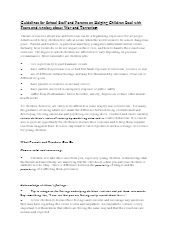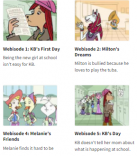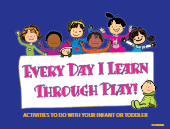It’s Ok to Worry About War and Conflict: A Resource Pack for Children Under 12 Years Old to Help Manage Difficult Feelings About War and Conflict
This is a valuable resource pack designed for children under 12, addressing concerns surrounding war and conflict. The pack offers practical strategies to manage anxiety and navigate challenging emotions. From understanding the concept of war to relaxation techniques and sleep tips, it equips children with essential coping skills. With guidance on reliable information sources and seeking support, children can confidently manage their emotions during difficult times.
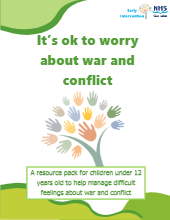

Talking to Children About War And Conflict: Guide for Caregivers
This resource provides guidance for adults supporting children and teenagers in understanding and coping with the impact of war and conflict. It emphasizes the importance of validating children’s emotions and being honest with them, while considering their age and developmental stage. It advises limiting exposure to graphic imagery and encourages conversations about the complexities of conflict. The resource also suggests participating in positive actions, such as highlighting helpers and spreading compassion, and offers creative ways to help children manage distress. Additionally, it provides conversation starters and prompts for fostering open communication and connection with children. Finally, it includes resources for further support and emphasizes the importance of self-care for adults.

Information for Parents and Professionals to Support Children and Adolescents Affected by War
This brochure offers critical support for parents and professionals aiding children and adolescents impacted by war. It provides guidance on discussing war, understanding age-related trauma and grief reactions, and fostering resilience after a crisis. The information is essential for those working directly with young refugees, offering early recognition of stress and trauma-related psychological reactions and highlighting approaches for support. Additionally, it lists contacts for further psychological assistance, ensuring comprehensive care for affected children. This resource is invaluable for caregivers, healthcare professionals, teachers, and volunteers dedicated to supporting the mental health and well-being of children facing the aftermath of conflict.

Helping Children Cope with The Challenges of War and Terrorism
This guide provides practical advice and activities to support children coping with the challenges of war and terrorism. It addresses the psychological and emotional needs of children between the ages of 7 to 12, offering strategies for parents and guardians to help children manage stress, understand conflict, and maintain normalcy. The resource emphasizes the importance of open communication, identifying emotions, and developing coping skills. It serves as a valuable tool for families, educators, and professionals seeking to foster resilience and understanding in children during times of conflict.
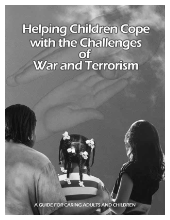
Guidelines for School Staff and Parents on Helping Children Deal with Fears and Anxiety about War and Terrorism
The guide provides essential support during challenging times. Parents and teachers play a crucial role in helping children understand current events, manage their emotions, and feel safe. These guidelines offer practical advice for adults to address children’s concerns, maintain routines, and foster tolerance. By acknowledging children’s feelings, providing reassurance, and limiting exposure to media coverage, adults can help children navigate the complexities of war and terrorism. Coordination between school and home, along with understanding and responding to changes in behavior, is vital for supporting children’s emotional well-being.
